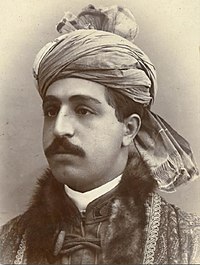Ghazi Ayub Khan
| Mohammad Ayub Khan | |||||
|---|---|---|---|---|---|
| Emir of Afghanistan | |||||

Ghazi Mohammad Ayub Khan
|
|||||
| Emir of Afghanistan | |||||
| Reign | 12 October 1879 – 31 May 1880 | ||||
| Predecessor | Mohammad Yaqub Khan | ||||
| Successor | Abdur Rahman Khan | ||||
| Born | 1857 Kabul, Afghanistan |
||||
| Died | 7 April 1914 (aged 56–57) Lahore, British India |
||||
| Burial | 1914 Peshawar |
||||
|
|||||
| Dynasty | Barakzai dynasty | ||||
| Father | Sher Ali Khan | ||||
| Mother | Momand | ||||
| Full name | |
|---|---|
| Mohammad Ayub Khan |
Ghazi Mohammad Ayub Khan (Pashto: غازي محمد ايوب خان) (1857 – April 7, 1914, Urdu: غازی محمد ایوب خان) was also known as The Victor of Maiwand or The Afghan Prince Charlie and was, for a while, the governor of Herat Province in Afghanistan. He was Emir of Afghanistan from October 12, 1879 to May 31, 1880 and was also the leader of Afghans in the Second Anglo-Afghan War. He is today remembered as National Hero of Afghanistan and is buried in Peshawar.
His father was Sher Ali Khan and his mother was the daughter of an influential Mohmand chief of Lalpura, Saadat Khan.
On July 27, 1880, inspired by the battle songs of Malalai of Maiwand in support of the freedom fighters, he defeated the British Army of George Burrows at the Battle of Maiwand. This was the biggest defeat for the Anglo-Indian army in the second Anglo-Afghan war. He went on to besiege the superiourly equipped British forces at Kandahar but did not succeed. On September 1, 1880, he was defeated and routed by forces led by General Frederick Roberts at the Battle of Kandahar, which saw the end of the Second Anglo-Afghan War.
...
Wikipedia
